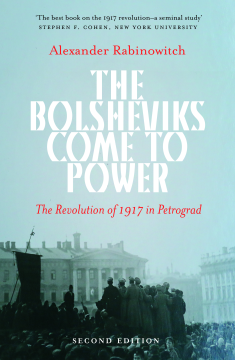
Additional Information
Book Details
Abstract
The Bolsheviks Come to Power is one of the most important histories of the Russian Revolution to challenge the mainstream narratives. Originally published to great acclaim in 2004, this new edition marks the 100th anniversary of one of the explosive and game-changing moments in modern times.
In this absorbing narrative, Alexander Rabinowitch counters the claims by mainstream historians that the revolution was a military coup led by Lenin and a small band of fanatics. He refutes the Soviet myth that the party's triumph in the October Revolution was inevitable, and explains the ebbs and flows of the revolutionary period, tracing the moods of the working class and the political positions of the Bolsheviks at different historical moments, including the immediate aftermath of the February Revolution, the July Days, the Kornilov affair, and up to and including the October Revolution itself.
Drawn from a wealth of primary sources and archival material, this new edition of Rabinowitch's classic account is a must-have for anyone interested in clearing away the tired platitudes of mainstream historians, and reclaiming the revolution on this important anniversary.
'A brilliant, convincing, and exciting book'
Stanley Plastrik, Dissent
'Essential reading…with a narrative skill which all too few historians could match'
Robert M. Slusser, Baltimore Sun
'Remains the best book on the 1917 Russian revolution - a seminal study of events that shaped history for decades and continues to do so even today'
Stephen F. Cohen, New York University
'I know of no previous work which has so skilfully presented the fluctuating state of the mood of the 'masses' in the Russian capital in those fateful months'
Leonard Shapiro, New York Review of Books
'Draws together the sequence of events in Petrograd, the mass moods there, and the role of the party, all the while demonstrating the reciprocal effects of each set of factors on one another…a vivid picture of politics in 1917'
Louis Menashe, Radical History Review
Table of Contents
| Section Title | Page | Action | Price |
|---|---|---|---|
| Cover | Cover | ||
| Contents | vii | ||
| Illustrations | xi | ||
| Acknowledgements | xiii | ||
| Note on Transliteration, Dates, and Terminology | xv | ||
| Preface to the Centenary Edition | xvii | ||
| Introduction | xxxiii | ||
| 1. The July Uprising | 1 | ||
| 2. The Bolsheviks Under Fire | 17 | ||
| 3. Petrograd During the Reaction | 39 | ||
| 4. The Ineffectiveness of Repression | 51 | ||
| 5. The Bolshevik Resurgence | 83 | ||
| 6. The Rise of Kornilov | 94 | ||
| 7. Kornilov versus Kerensky | 110 | ||
| 8. The Bolsheviks and Kornilov's Defeat | 129 | ||
| 9. The Question of a New Government | 151 | ||
| 10. \"All Power to the Soviets! | 168 | ||
| 11. Lenin's Campaign for an Insurrection | 191 | ||
| 12. Obstacles to an Uprising | 209 | ||
| 13. The Garrison Crisis and the Military Revolutionary Committee | 224 | ||
| 14. On the Eve | 249 | ||
| 15. The Bolsheviks Come to Power | 273 | ||
| 16. Epilogue | 305 | ||
| Notes | 315 | ||
| Selected Bibliography | 358 | ||
| Index | 379 |
